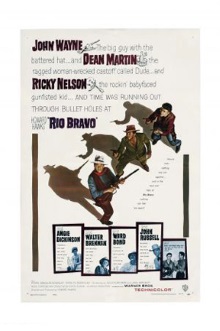
The fact that Rio Bravo is frequently placed near the top of lists of the best Westerns ever made is reason enough to see it but I was especially intrigued by how it made by Howard Hawks and John Wayne specifically as a response to High Noon. In case you don’t know, that film was about a sheriff who has to confront a powerful criminal gang and went around the town to solicit help but everyone just made their excuses and minded their own business. This didn’t sit well with Wayne at all who called it un-American and even helped to run the screenwriter of the film, Carl Foreman, out of the country for being a Communist sympathizer.
One night in the tiny town of Rio Bravo, local ne’er-do-well Joe Burdette murders a man in cold blood in a saloon. The sheriff John T. Chance, played naturally by Wayne himself, takes him and it’s also an opportunity for his deputy Dude to redeem himself after spending over a year in a drunken haze due to a girl. The problem is that Joe’s brother is a rich rancher with plenty of hired guns on his payroll so they expect trouble and the only other deputy he has is the aged and partially crippled Stumpy. Fortunately plenty of people show up to help the outnumbered sheriff including a young gunslinger nicknamed Colorado, a saucy and sexy cardsharp nicknamed Feathers who the sheriff initially suspects of being of being a con artist and even the owner of the local hotel, a Mexican named Carlos.
As a take of High Noon except in the opposite direction, this is pretty naked. Ordinarily I’d expect this to be trite, but it’s not for nothing that Hawks is one of the greatest American directors of all time and he just about manages to pull it off. The film oozes with feel-good American boosterism but it never gets on your nerves. It helps that Chance isn’t some kind of cowboy superhero. Though a competent gunman, he still makes mistakes and can be beaten by the bad guys but has his loyal and dependable allies to save him when needed. In return, Chance rewards them by providing moral support, a kind of manly tough love that is deliciously played with in the scene in which Chance kisses the top of Stumpy’s head, and by being the patriarch and pillar for the entire community. The single best scene of the film is when the heroes are waiting in the jail for the inevitable assault but instead of being nervous and scared they enjoy each other’s company and pass the time by singing songs, no doubt made possible because two of them, Dean Martin and Ricky Nelson, are played by performers who are more famous for being singers than actors. It’s probably one of the finest examples of masculine camaraderie ever put on film.
The film’s focus on the hero’s relationships with his allies can also be seen in his interactions with Feathers. Despite his insistence that she leave town as soon as possible for her own safety, she stays behind to help even if it means going behind her back. It’s a delicious depiction of a tsundere infatuation and since Wayne is his usual stoic self most of the time, the smoking hot Angie Dickinson acts for the both of them or as she says, she’s the one who does most of the talking. The film also surprised me by not using her as the damsel who needs rescuing. Instead it’s poor Dude who needs to be saved, and on two separate occasions at that.
The villains on the other hand get short shift. Not just in having less characterization than a cardboard cut-out but by being used as a punching bag for the good guys. High Noon had a sense of tension that inexorably ratcheted up over time, exemplified by frequent shots of the ticking clock. Hawks tries his best but Chance and his allies never feel like they’re in much danger. Part of this is because Chance has plenty of competent allies to call on but another reason is that the villains seem oddly reluctant to actually kill them. One flunky explains that their boss wants the sheriff alive and of course they’re effectively holding the boss’ brother hostage in a jail cell. The good guys however fight with no such compunctions and cheerfully kill the bad guys in droves. It strikes me that this bloodthirstiness feels at odds with them with the heroes and that while this is a great film while American Sniper is a terrible one, it’s the same sort of morality at play. Stumpy even repeatedly states that he’ll “accidentally” shoot the imprisoned and unarmed Joe if his brother manages to get into the jail.
As hoary as all this sounds, I can’t deny that there’s something very reassuring and solid about Rio Bravo. It’s such a wholesome, romanticized view of justice in the mythical Wild West that it’s no wonder it topped so many of the lists. On balance however while it’s better than it has any business being, High Noon still has it beat with its originality, unparalleled sense of tension and its deeper message about the dark heart of humanity.